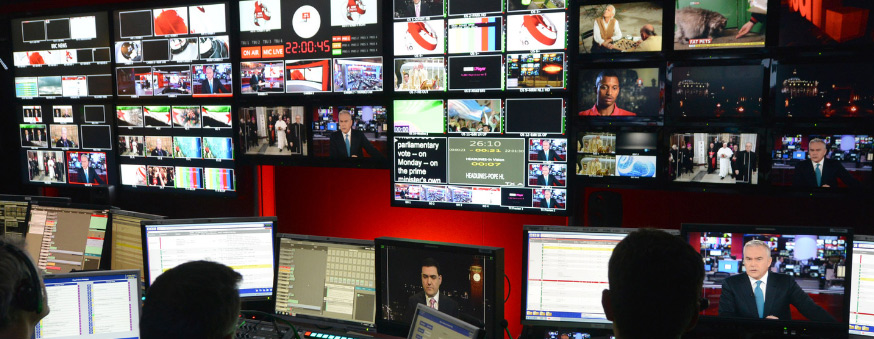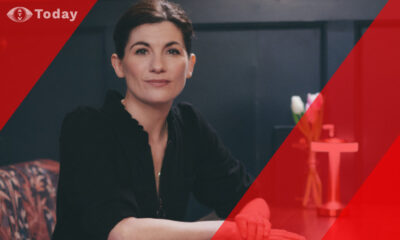TV
TV networks to share ‘inclusion passports’ for disabled colleagues and visitors
UKTV and seven of the UK’s main broadcasters have come together to create access and inclusion ‘passports’.
The aim is to remove barriers and support better inclusion of disabled people and other colleagues at work. Channel 4, ITV, BBC, STV, UKTV, S4C and Paramount UK have consulted to agree on a similar approach which will see broadcasters encouraging staff to communicate their adjustment needs. The access and inclusion passports, adopted from an initiative formally introduced at the BBC in 2019, will be confidential and will support conversations with line managers to ensure disabled colleagues and others get the right support they need at work.
Ally Castle, Creative Diversity Lead for Disability at Channel 4:
“Disabled talent and others have lobbied for solutions to the challenges they face which stop them thriving in the workplace, and we are now at a very good place in finding something that will really address people’s needs in our sector. A collaborative approach is the only way that this can really work in practice, and we are delighted with the progress made between the seven organisations on board. It’s a really strong basis for rolling the concept out more widely across the industry, and for disabled freelancers too.”
The passports will also be transferrable to enable colleagues to move smoothly across departments and between broadcasters, reducing the need for disabled talent and staff to repeatedly disclose their adjustment needs to each new employer or manager. Crucially, managers will be supported at each organisation to help them work with employees and their passports most effectively.
The plans will cover disabled colleagues at the organisations involved, with an ambition to introduce them into the independent production sector to also support disabled freelancers.
The project is an important milestone in collective efforts by the broadcast industry to remove some of the challenging barriers that disabled talent face when working in TV. Each broadcaster has its own plan for introducing the passports in coming months and will adapt them to meet their business priorities. Channel 4’s passport will go beyond disability and health to support staff to talk about any circumstances which may impact life at work.
Sam Tatlow, Creative Diversity Partner at ITV:
“Getting everyone around the table to work on a combined solution to support disabled colleagues is one really positive step towards us shifting the dial on accessibility and access in our industry. The access passport enables our disabled colleagues to take charge of the conversation when discussing what support they need, and provides line managers with the tools to engage in the conversation confidently. The more confident we all get in talking about disability the better the industry as a whole will become for disabled people joining and progressing.”
The BBC was the first UK broadcaster to formally launch passports in 2019, introduced as one of the recommendations made in a report on career progression and culture for disabled staff at the Corporation published in November 2018 which was aimed at raising awareness and creating a disability-friendly environment. Following a recent review, the BBC has made a number of modifications to the passport and will roll out an internal communications campaign to emphasise to staff the benefits of the scheme alongside promoting it’s usage via a range of other initiatives, such the BBC’s Disability Allies programme.
Channel 4 has extended its passport plan to go beyond disability and health. Its Inclusion Passport will support staff to talk about any experiences and circumstances which may impact life at home and work, including caring responsibilities or faith practices. This approach was piloted in 2021 and will be rolled out in coming weeks. This continues its pioneering approach to staff wellbeing, including being the first major broadcaster to introduce both Menopause and Pregnancy Loss policies.
Miranda Wayland, Head of Creative and Workforce Diversity and Inclusion at the BBC:
“We need a BBC and an industry that is accessible for all where no one is excluded or held back as a result of a disability. The passport is a positive action that is designed so that colleagues can easily share information about their disability and any particular requirements and workplace adjustments with their team leader, helping facilitate conversation or prevent having to re-explain when moving roles. We’re extremely proud to have launched the scheme three years ago and thrilled that it has been adopted and strengthened through collaboration with our broadcasting partners.”
ITV began the roll out of their Disability Access Passport in December ’21 as part of their Diversity Acceleration Plan and Accelerating Disability into the Mainstream commitments. The passports are also embedded into the recruitment and performance review to ensure disabled colleagues have a number of opportunities to discuss their needs and adjustments with their line manager. Disability inclusion training, delivered by thinkBIGGER!, is also being rolled out support line managers in this process.
STV is introducing the passport as part of its commitment to create inclusive and accessible working environments for all colleagues. The passport will provide a framework to discuss and identify any in-work support, access or adjustments that will support a colleagues’ ability to thrive in their role. Opportunities to introduce the passport will be rolled out across recruitment, onboarding and development processes to help break down and overcome any perceived barriers to progression.
UKTV is also launching a disability access passport this year. Embedded as part of the recruitment and onboarding plan and also rolled out across the business, it will provide a framework within which to discuss the employee’s health and any adjustments they might need to assist them at work. Disability inclusion training and Neurodivergent learning lounges are also planned to further support managers and staff. This is part of UKTV’s disability strategy and holistic approach to workplace wellbeing, along with recently participating in the Mind Workplace Wellbeing Index and partnering with disability organisations such as Diversity and Ability, and We Are Purple as their media sponsor for Purple Tuesday.
Samantha Renke, Paramount’s Disability Advisor:
“Paramount’s commitment to disability inclusion is stronger than ever and as we build on the work of our Disability Action Plan we will be rolling out disability / wellbeing passports across the business, working with all of our internal stakeholders including HR and the Office of Global Inclusion. Wellbeing is a focal point for the company and it is important to us that the passports are seen as a channel of support for everyone across the business.”
S4C will look to pilot its passport scheme later this year, as a crucial step in fostering progress in good work place practices around disability inclusion. Doing so alongside other broadcasters will allow for good practice to be shared and ensure support for the wider production sector to take on similar schemes in the near future.
Paramount UK will be rolling out disability / wellbeing passports across the organisation as part of its Disability Action Plan, being spearheaded by the Office of Global Inclusion, the HR team and Paramount’s Disability Advisor, Samantha Renke. It builds on a range of actions being taken as part of the Action Plan including launching a new Disability employee resource group and creating Disability Ambassadors across the business.











